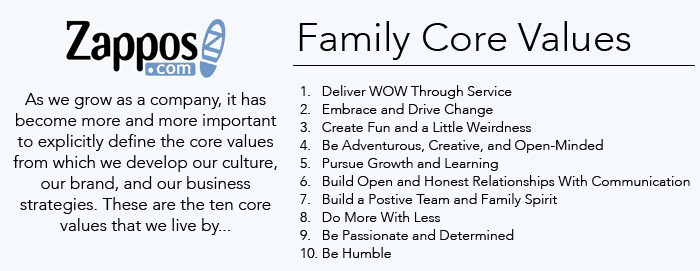You may have probably heard about company culture and core values, so today I want to share some ideas about values. This title “values for which hire and fire” is the adaptation of an excerpt from a book mentioned below, and what it means is that you should base your recruitment process following your -company, department, team- core values, and you should also let people leave the company when they did not fit to them.
There are lots of posts, articles, tweets, regarding values and company culture. But it was reading “Delivering Happiness” (influenced by heavyweight books like “Good to Great” by Jim Collins, and “Tribal Leadership” by Dave Logan and John King) when I could understand the need and its real effect on a company, and its growth.
What are the Values?
But let’s start from the beginning. We all have talked about values, we all have heard about them, but what is the meaning of values?
Values are our beliefs, the things that are important to us, that motivates us, and our behavior, goals, and principles are built based on them. Our values are mostly formed based on our life experiences and our culture. From a company perspective, they define a company behavior and are its guiding principles.
For the business dictionary, values are: “Important and lasting beliefs or ideals shared by the members of a culture about what is good or bad and desirable or undesirable. Values have a major influence on a person’s behavior and attitude and serve as broad guidelines in all situations. Some common business values are fairness, innovation, and community involvement.”
If you’re interested in deepening about values and ethic you’ll always find a complete Wikipedia page about it :)
Values and their effect over the working environment
Studies show that the working environment is key to influence employee motivation and happiness, improving their productivity and efficiency. Other benefits are that it could reduce costs related to absenteeism, turnover, medical’s, etc.
The net is plenty of articles related to this topic. You could read that it is important to provide the right or needed tools, that you could redesign the workplace, avoid micromanagement (I loved this one), focus on employee health, have a clean and organized workplace, and lots of other good ideas to improve the working environment, but most of them will end up with setting the right company culture and creating a positive (also called healthy) environment.
In my opinion, the last two are linked. You can work on your company culture when you identify and work based on your company values, and creating a healthy environment has dependency on the management strategy but also on the values shared by all the employees.
Real examples
Tony Hsieh in his book “Delivering Happiness” shared first the rapid growth of LinkExchange, where they started being a group of friends (and friends of friends) sharing a mission and finished being strangers looking for personal growth and profit. And later, the growth of Zappos especially when they moved to Las Vegas, where they decided to create a list of core values that would help them to focus on keeping their company culture and at the same time protect and strengthen their brand.
The title of this post is taken from his book:
We believe that it’s really important to come up with core values that you can commit to. And by commit, we mean that you’re willing to hire and fire based on them. If you’re willing to do that, then you’re well on your way to building a company culture that is in line with the brand you want to build.
Excerpt from the book “Delivering Happiness” by Tony Hsieh
Let’s take a look at some of their values in order to let you see what they wanted to focus on.
- Be Humble. Yes, as simple as it sounds. And the one that affected their hiring decisions the most! Imagine you find a candidate that would bring a lot of value to your company, which would have a high impact in the short-term, but it doesn’t fit your company values (maybe it is egoistical, conceited), so you don’t hire. Sounds easy, isn’t it?
- Create fun and little weirdness. Is it a value that you would include in your company core values list? They did. In my personal experience, creating fun has been one of the principles I have always defended and followed. I could say that after 45 minutes of work, it is demonstrated that our mind loses focus, and it is good to give it a break. But creating fun and relaxed moments is good for a team mood, and enables and strengthen links between members. Have you ever tried?
- Be passionate and determined. If you have a clear higher purpose when doing your job, you are probably fortunate, but in general, passion has to be what drives our work. How many companies say honestly and openly to their employees that they have to be passionate about their job? Have you ever been said to?
There are other Values (up to 10) like embrace the change, pursue growth, being open-minded, build a positive and family spirit, do more with less, and not to forget their famous “Deliver WOW through service” (their mission is to have the best customer experience possible). All of them are enough important to be shared but also more usual to find. If you want to discuss any of them or about their culture book, just leave a comment. I recommend you to read the book, worth the read, but find here all ten core Values.

Let’s change to another example, from another country. I recently finished another book that brings a good one to learn from, “Always people first” (in Spanish “Las personas primero #AlwaysPeopleFirst”) by Xavier Escales. This book shares a story of a company, Asics Iberia, and its strategy focused on its employees (people-centered) as its path to success, to profit.
In their experience during the 10-year rapid growth of Asics in Spain, they end up realizing that the people they were happier with weren’t always the ones with the best academics or experience, but the people with more energy and commitment with the brand or company. So they decided to focus their recruitment process into these values:
- They have to be good people.
- They have to be hard workers and responsible.
- Their work at Asics had to make their eyes brighter.
A recruitment consultancy would expect the job description to include experience and academics (bachelor, master, or MBA, Ph.D.), but not base their search in that terms.
They have to be “good people” vs “bachelor, master, MBA, Ph.D.”. This is important. Do you agree with it?
Personal experience and opinion
In my short experience, companies had mostly failed to build up their company values. At some point in their existence they looked for them, tried to identify their values through their employee’s opinions, and always expected them to be totally different, values that they never fostered.
This is why it is important to set up clear company values and commit to them, allowing the company to grow based on them and its culture. Trying to set them up later could be more complicated, require big changes and decisions, and take much longer.
In other cases, due to growth, evolution, or just time passing, the values that were good in the past, are not in the present. But this is not bad at all, they are part of the DNA, the culture, and the company. It turned out that they have to change.
Anyway, don’t think that avoid committing to values is only responsibility of the company, all of us (managers, leads, employees) are responsible for them. In my humble opinion:
- As a manager and servant leader, it is your responsibility to provide the best environment to your team, promoting the values you want your team to provide (communication, growth, open-mindedness, relationship, commitment, work methodology), always leading by example, and also to hire the proper people, not only thinking on the value they could add, but keeping the environment safe or strengthen it.
- As an employee and team member, it is your responsibility to commit to your team/area/company values, protect your team environment, to be hard worker, build relationships and communication (nowadays communication is key), and remember always that success is a team effort. A colleague used to say that when we do work, we have to do it thinking that we have to make our grandparents proud of it.
In agile methodologies and Scrum, commitment and responsibility is key for any team and team member, in order to achieve success as an autonomous team. In a dynamic and fast-moving world, success in a company is related to how fast it can move, and how fast it can adapt to changes. In this sense, values are the main “glue” that can help to succeed.
I recently took part in a twitter thread originated by a David Marquet tweet. The idea behind the debate was “what provides safety and inclusion to team members”. Again, I remembered this post title because it is not only that you have to care about people while it is your responsibility, but when you are in a hiring process. People you include in your team might fit into it, because the work should have been previously done, because you should have built up before an environment that, as said by Lt. Marquet, enables “valuing different options, not judging, shunning, or avoiding them”.
I am not the perfect manager, always learning in order to be a better person and professional. And I don’t consider myself an example to follow. I have always seen managers as enablers, and have very clear that team success is manager’s.
I hope you found interesting any of the ideas shared in the post. Please consider that these are personal opinions and sometimes they could have been explained in the wrong way (I am not English native).
If you have any experiences, share them! They all surely will bring value to the post, and I would love to learn from them!
Thanks for reading.
Also published on Medium.
Join the FREE Newsletter
Also published on Medium.
